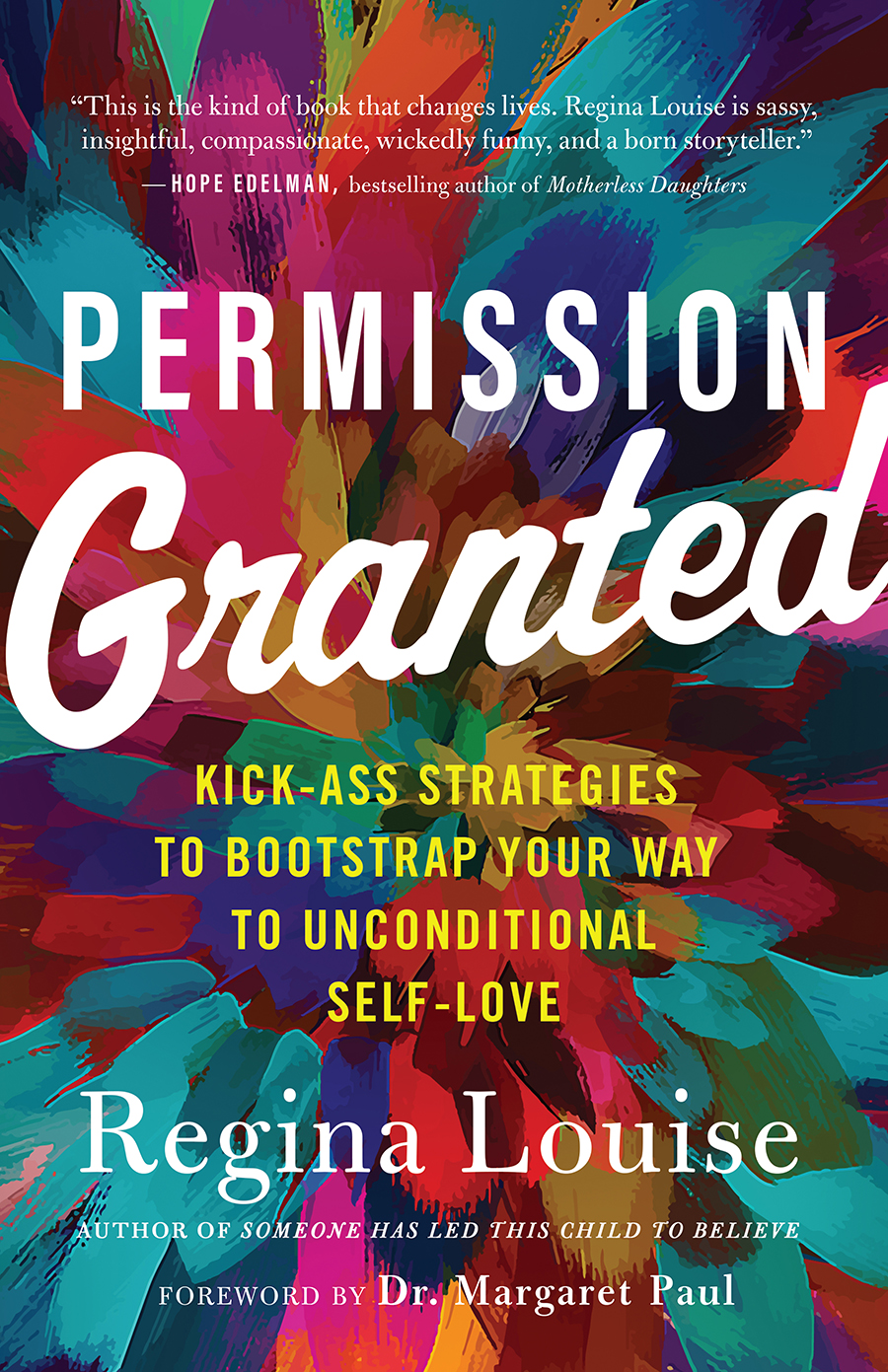
*Adapted from Permission Granted by Regina Louise
~
It is no secret by now that my childhood was bushwhacked, hijacked, and left to wither by the side of the road as a result of profound neglect, abuse, and incessant chaos.
Beatings and insults were the means of engagement in my family system. If you’ve read either of my memoirs, Somebody’s Someone or Someone Has Led This Child to Believe, you know that I lived in the same foster home my biological mother had grown up in. Because my mother was a child having a child, she was unprepared to be a parent and therefore abandoned me with her caregivers.
Very early on, when I was around eleven years old, I decided that I would not allow my life to be defined by the ill-fated actions of my traumatized and unprotected young mother. Like anyone of sound mind, I wanted more. I needed more. My desire for freedom and personal expression were calling from deep within my spirit. I wanted a life devoid of judgment and shame.
My dreams were in part stoked by the only books available for me to read at that time, Nancy Drew, The Hardy Boys, and Pippi Longstocking. Within these pages lay a world beyond the one I awoke to every morning. A world where I constantly hoped to find the hidden door that would lead me to the real world, the one I was convinced I’d accidentally been locked out of.
If all the children I’d read about could have what felt to me a safe-enough adult to guide their lives, why couldn’t I? Never once did I believe that they deserved it and I didn’t. More than anything, I believed I could say what I wanted, if only to myself, and that one day I’d get what I’d written on my heart. And somehow, I understood that I must act the way I wanted to become. And it was this knowing, this willingness to succumb to the power of imagination, that led me to consider a strategy to flip the script on my circumstances.
I was a child when I first learned to trust my instincts and take the reins of my own permission. (I’ll tell you the whole story just below.) I use the word trust quite intentionally here. The connection and unity inherent in the word trust was brought to my attention recently by my dear friend the poet Susan Wooldridge. Susan is the author of the gem Poemcrazy: Freeing Your Life with Words. I’d made a post on Instagram right after speaking to the Council for Leaders in Alabama Schools. I shared that I’d summarized the takeaway of the keynote presentation in the neat little acronym PACT, which stands for Presence, Acceptance, Courage, Trust. That’s when my girl chimed in with her comment, “Trust. Holds the word us,” followed by the heart, praying hands, and shining-star emojis. Leave it to the poets to discover words within words.
Recognizing the us in trust allowed me to see the relational value inherent in the word, the possibility of inclusiveness and belonging. Trust invites us to remain true to who we are, to uphold our integrity in the face of challenges, knowing that we can rely on it at a moment’s notice. Trust binds us to like-minded others. Especially if we grant ourselves permission to trust ourselves.
We can heal so much within us when we become willing to make a PACT with ourselves. Whether we are dealing with fear, anxiety, or uncertainty or with a lack of confidence, self-love, or courage, to give to ourselves in ways that support us in showing up as our best selves again and again and again is the definition of self-acceptance and unconditional love.
What might it take for you to consider stepping into your presence, acceptance, compassion, and trust as a way forward? What amount of havingness do you imagine might come to you as a result of such acts? This leads me to the day I made my first pact with what I have now come to know as my highest good, the quality in me that is a gift from the realm of the Divine.
In other words, it’s how what is invisible becomes visible in the way of infinite grace.
Presence
Presence is the ability to show up in the moment with your awareness intact, wide-open to where and who you are; your listening is tuned in, your heart is cleared out, and you are attuned in the moment to what you’re doing and how you intend to be. Presence is one of the most powerful states, whether sleeping or awake, I have experienced.
Presence is being with Spirit, blending with whatever is happening and staying the course for as long as needed. It’s matching up our inner world with our outer expression. It’s a practice of aligning who we say we are with actually being what we believe to be true about us. On our terms.
Acceptance
Acceptance requires our consent. It asks us to be in agreement with what is. By doing so, by giving ourselves permission to accept what is, we are invited not to grasp, not to challenge, but simply to let go and trust in the moment. Have you ever had an experience when you just knew that something was off, when the atmosphere didn’t feel quite right? I will always remember a particular incident that was wrought with fear and confusion. I was eleven. Sadly, the upshot of coming from an early life of complete chaos was learning to become present on a dime to changes in the atmosphere of wherever I lived. Hypervigilance, I believe it is called.
Prior to the day when I was beaten within an inch of my life, I’d made a pact with God. It was clean and simple: God, should I be beaten one more time, I’ll know it’s a sign for me to leave. I was engaged in a battle of wills between myself and my overwhelmed caretaker. By the time they were in charge of caring for me, my mother had already left. I had to face this adult on my own terms. Making the pact in the first place meant I was accepting the responsibility not to allow anyone to beat me ever again. It was also the day that I gave my trust over to Spirit and the moment not only when my faith was put to the test but also when my awareness of faith came into being.
I felt it, deeply, that I had slowly but surely outgrown the situation over the years and that a change must come if I was going to survive to see the light of adulthood.
With acceptance, we permit ourselves to receive a way out. Acceptance also allows us to be received, gives us a new way to belong to something greater than before.
Courage
To assume the risk involved in whatever endeavor we choose to undertake, we need courage. We move from and with our heart, trusting in our ability to face, on our terms, whatever needs facing, whether it be our emotions, our suffering, our desire to be who we want to be in the face of opposition. Courage springs forth from an inner place, from a remembrance of what came before your current need, reminding you how your resilience helps you to understand the risks and to move forward anyway.
The audacity of jumping empty-handed into the void, leaning in toward any disturbance in our emotional field, standing firm against social humiliation, doing the right thing when no one else will is courage in action. To move from courage is to be concerned with neither the good nor the bad, the right nor the wrong; it is to show up fully without knowing what the outcome will be. Courage permits us to feel the full spectrum of our emotions without needing to hide from our own vulnerability, our own intimacy. Courage requires us to begin where we are, paving the way for us to face what we fear, befriend it, and come through to the other side, understanding and receiving the learning and growth that come from whatever we were courageous enough to permit.
So the day I received that beating I’d decided would be my last, I left home at age eleven, taking a Greyhound bus to North Carolina to reunite with my mother. That day, armed with courage, I did so knowing it was what both my heart and my spirit insisted on me doing. Although it didn’t end up working out for me to live with my mother—my trip there was followed by two years of back and forth between her home and my father’s in California, until I finally had to turn myself in at a police department—the fact that I had enough inner trust to save myself was all that mattered.
Trust
To trust another person is to have faith that they will come through for you. It is to rely so much on faith that all lesser beliefs that may try to override our sense of faith such as “I’m not worthy” or “God has failed me” fall by the wayside. You are strengthened by what you believe, you are buoyed, you hold firm to this knowing. You extend your trust to your friends, family members, and lovers with the faith that your intimacies will not be betrayed or exploited, that your vulnerabilities will be respected and therefore protected.
I believe that by grace I can restore my trust each time it has been breached, and so can you. Your permission creates access to this truth. Trust is evergreen in terms of my direct relationship to it and how it holds and keeps me, for trust begins with me. I want to be clear that I am not saying here that even when someone betrays you, you immediately give them access back into your life. I am also a proponent of Maya Angelou’s most salient quote—at least for me: “When people show you who they are, believe them.”
When trust is betrayed, it’s important to, well, trust the red flags and interior experiences that signal a breach has occurred and to do what’s needed to suture that breach. It takes time to heal from a betrayal. My highest recommendation is to do so on your own terms as opposed to the terms negotiated by the person who betrayed you. Trust is not something out there, a destination we can travel to and check out as we like. Trust originates from within our souls. We come from trust, and it comes through us, in us, as us.
I’ll say it again. Above all else, we need to trust ourselves. I’ve earned my own trust as a result of the many times I have remained worthy to my word, remained true to who I believe myself to be, someone who works to make my actions congruent with my words. When we trust ourselves, we learn what qualities to look for before we decide to trust another.
~
Adapted from the book from Permission Granted. Copyright ©2021 by Regina Louise. Printed with permission from New World Library.

AUTHOR: REGINA LOUISE
IMAGE: ELEATELL/PIXABAY

Read 4 comments and reply